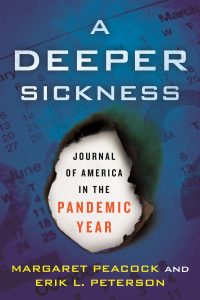In January 2020, two award-winning history professors set out to track the medical and media phenomena surrounding the outbreak of a novel coronavirus in China. What started as a side-project quickly became an all-consuming, effort to make sense of a global pandemic. Based on extensive research, contributions from a national team of experts, dozens of interviews, and hundreds of collected stories, Drs. Margaret Peacock and Erik L. Peterson set out to examine the intersecting crises that plagued the nation. They revealed a health structure rooted in a culture of acute care that was hobbled by entrenched racial hierarchies, lasting economic disparity, and a willful historical amnesia. These factors more than anything else led to the pandemics of disease, disinformation, poverty, and violence that caused such unimaginable catastrophe.
This digital museum accompanies Peacock and Peterson’s book, A Deeper Sickness: Journal of America in the Pandemic Year. Beacon Press, 2022.
The DAILY ENTRIES cover 200 days of the year 2020. Search for a particular day using the tool in upper right corner of the site, or just get started here!. You can explore over 12,000 sources collected from the year, along with an extraordinary amount of additional material including interview transcripts, social media posts, submitted eyewitness accounts, and plenty of historical analysis.
In the EXHIBITS section are housed essays from scholars around the country, creative works submitted by renowned artists, and meritorious undergraduate research projects—all of them dedicated to the study of 2020. If you are a scholar or artist and are interested in submitting a piece (which will include peer review), send an email to mepeacock@ua.edu and we will consider it.
Memory fades. Alongside the book, this site is an attempt to keep that memory raw. You might disagree with our analyses of these events. We encourage you to examine the sources for yourself. There are certain realities about this year that should not be forgotten. Yet Americans, as we found, too often substitute folklore for history.
